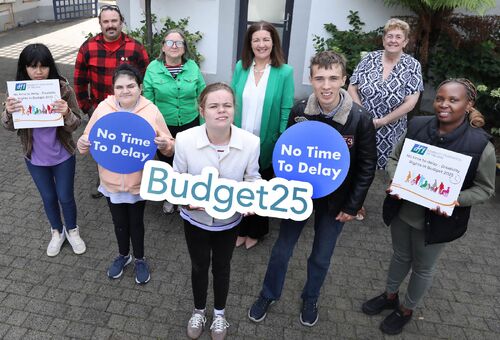No time to delay – Budget 2025 must make a different choice on disability
September 9 2024

Press Release – 9th September 2024 - Immediate
The experience of people with disabilities in Ireland continues to be one of financial precarity and higher risk of social exclusion. The Disability Federation of Ireland, in their Pre-budget Submission 2025, highlights how last year 16.5% of people unable to work due to long-standing health problem (disability) lived in consistent poverty, 4.5 times higher than the national average of 3.6%. Ongoing issues also persist in the availability of health and social services, in the provision of suitable housing for people with disabilities, and with community inclusion and access.
With less than a month to Budget 2025, DFI is calling on the Government to deliver on its commitment to disabled people outlined in the Programme for Government that they “are now serious about making a difference – a difference that will make things better.”
DFI CEO Elaine Teague said: “Last year 44.7% of people unable to work due to long standing health difficulty (disability) experienced enforced deprivation, unable to afford basic essentials like heating, new clothes, or socialising with friends or family. Ireland is a wealthy country and it is a national shame that we are amongst the worst countries in the EU for the rates of poverty experienced by disabled people, and low levels of employment. We must address the structural barriers that prevent real and meaningful inclusion; including the significant extra cost of having a disability, the impact that has on individuals’ financial stability and the barriers it creates to employment. It’s time to bring in a Cost of Disability payment to address this.”
Budget 2025 is also an opportunity to address the sustainability of community supports which are critically important to enable independent living, supporting disabled people to live self-determined lives. Community and social disability supports and services, the majority of which are provided by the community and voluntary sector, are under continuous pressure; placing a significant risk on their continuity. DFI Director of Advocacy, Emer Begley states that DFI member organisations “Continue to struggle with ongoing issues of underfunding, which is further exacerbated by the absence of multi-annual planning, and a lack of pay parity for workers. This is directly impacting the ongoing recruitment and retention crisis. It is imperative that Budget 2025 addresses these issues and ensures that people with disabilities can have security and ease of access to person-centred community supports.”
DFI’s pre-budget submission 2025 sets out a series of recommendations to address the poverty and exclusion experienced by people with disabilities. It calls for action in the following key areas:
Sustainable health and social care services with funding provision to deliver the Action Plan for Disability Services 2024-2026.
Tackling poverty experienced by disabled people, the extra Cost of Disability and employment by introducing a recurring Cost of Disability payment of €2,600 a year, or €50 a week.
Ensuring community inclusion and participation through the development of a new programme to create disability inclusive communities.
Realising housing for all by provide funding to implement the National Housing Strategy for Disabled People 2022-2027.
You can read the full submission here.
Notes to editors:
Disabled people and their families are the human faces behind these numbers and statistics:
Disabled people live with extra costs of €10,397 - €15,177 each year (factoring in recent inflation), which are not covered by existing social welfare provision. The annual basic income provided by Disability Allowance in 2024 is €12,064. (Indecon, 2021, Consumer Price Index Inflation Calculator).
Ireland ranks 22nd in the EU 27 for disability poverty, and lowest in the EU for its disability employment gap (Roadmap for Social Inclusion Progress Report, European Disability Forum 2023).
One in two disabled people who are unable to work (44.7%) live in deprivation (CSO SILC, 2023).
1,228 people with disabilities under sixty-five are inappropriately living in nursing homes. (Nursing Home Support Scheme, November 2023)
Between 2016-2020 the number of people on the housing list reduced by almost 33%. But the number of people with a disability basis of need reduced by just 12% over the same period. (Housing Agency, Analysis of Households with a Disability Basis of Need for Social Housing, 2016-2020, 2021)
Just under one in five people who experienced a condition or difficulty (disability) to a great extent reported bad or very bad health in 2023, compared with just 1.7% of the general population. (Census 2022)
In September 2023, approximately 15,000 children were waiting on initial contact from their Children’s Disability Network Team, with almost two thirds waiting over 12 months. (DCEDIY, Action Plan for Disability Services 2024-2026, 2023)
The DFI's Pre-Budget Submission is available on /budget25
For media contact: Colm Scanlon, Policy, Advocacy and Campaigns Assistant, Disability Federation of Ireland, 01 425 0126 colmscanlon@disability-federation.ie
